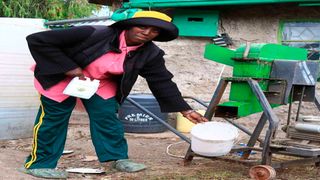
Jacqueline Wamuyu demonstrates how she makes a bio-pesticide to curb fall armyworms at her Mirera home in Laikipia County.
| Joseph Kanyi | Nation Media GroupSeeds of Gold
Premium
Armyworms meet their match in ex-teacher’s bio-pesticide
What you need to know:
- The founder of Dudu Company Limited makes a bio-pesticide to control fall armyworms, one of the most destructive pest.
- Jacqueline was last year recognised as one of the top innovators by the Laikipia county government during Mashujaa Day.
Some 10 kilometres from Nanyuki town in Laikipia County, one finds Mirera, a semi-arid area that is sparsely populated. Most farmers here grow maize, beans, cabbages and tomatoes.
Jacqueline Wamuyu, 49, is one of the residents of Mirera. The founder of Dudu Company Limited makes a bio-pesticide to control fall armyworms, one of the most destructive pest that feeds on pasture and cereals.
She makes the chemical using seven different types of wild plants, soap mixture and pepper.
“All the plants that I use in the bio-pesticide are medicinal. They include aloe vera and Ajuga remota, which is the most dominant in the area.”
Ajuga remota is a species of the bugleweed plants, a genus with over 300 varieties used as a herbal remedy for fever and infections. It is commonly used to treat malaria. On the other hand, aloe vera contains anti-bacterial, anti-viral and antiseptic properties that help heal wounds and treat skin problems.
To prepare the bio-pesticide, she grinds the plant leaves using a machine, before mixing with water that contains a small amount of detergent. The mixture depends on the quantity of the bio-pesticide to be made.
“Four kilos of the plant leaves require about 50 litres of soapy water to make a bio-pesticide,” she says.
She then soaks the mixture for seven days after adding pepper to it. Later, she will sieve the liquid for use as bio-pesticide. According to her, hot pepper should be used in smaller quantities since a higher concentration of it might destroy the crops.
Unexpected job loss
“Pepper and soap kill the armyworms’ larvae and eggs while the Ajuga remota and aloe vera makes the bio-pesticide acidic keeping the insects away.”
Jacqueline, a primary school teacher, left employment in 2013 after 21 years following closure of the private institution where she was teaching English and Christian Relgious Education.
Following the unexpected job loss, she ventured into farming to sustain her family of three.
“Sometime in 2017, my two-acre farm hosting maize, beans and cowpeas was attacked by the voracious insects. I started experimenting on how to control them using inorganic pesticides with little success.”
Online research led her to use of home-made bio-pesticide.
“I made one from chilli and water but it did not work. I added a detergent and the results improved.”
After much trial and error, in 2019 she ended up with a product that she is working to get it certified by the Kenya Plant Health Inspectorate Service (Kephis) , becoming a huge breakthrough in her business.
She applied for Laikipia Enterprise Fund loan, successfully getting Sh190,000 that she pumped into her business.
Eliminating the pest
Using the money, she constructed a semi-permanent workshop at her homestead, bought a chopping machine and a sprayer.
Her first customer was a neighbour who had planted maize, beans and pumpkins on three acres. Success in eliminating the pest saw her get referrals.
For effective control, she sprays the crops twice; when young because they are at a critical stage and when they start reproducing.
In a day, she makes 20 one-litre containers of bio-pesticides, each that goes for Sh1,000. Her customers are farmers from Nyandarua, Kajiado, Meru and Tharaka- Nithi counties.
Jacqueline is a beneficiary of the Laikipia Innovation Development Programme (LIDP), which is helping her advance her skills on running the business. The county government is helping her register the product with the Kenya Industrial Property Institute.
The registration seeks to ensure her product is patented and the ideas of the product are solely hers. She employs one worker who markets the product though the business was slowed down by a stroke she suffered last year.
Despite the challenge, Jacqueline was last year recognised as one of the top innovators by the Laikipia county government during Mashujaa Day. The main challenge facing the business is the scarcity of wild plants since they are sourced from the forest.
Another challenge is that the plants are harmful as they cause skin irritations during preparation. Besides armyworms, she says the bio-pesticide also eliminates pests like white flies.
Bio-pesticides
Dr Jane Nyaanga, a senior lecturer at the Crop Entomology Department at Egerton University, advises farmers to consider plants with bioactive substances (phenolic compounds) with insecticidal properties while making bio-pesticides. They include pyrethrum, neem, Mexican marigold, onions and tobacco.
According to her, one should extract the bioactive compounds from the plant materials, which can be leaves, roots, fruits or flowers.
The extraction procedure may include maceration, digestion, fermentation, decoction, infusion or percolation in solvents that include water and alcohols.
“But the rate at which the filtered material should be diluted with water varies with different bio-pesticides and the pest being controlled,” she says.
One should carry out an efficacy trial to establish the most effective water to bio-pesticide dilution ratio.
Also, any type of detergent is recommended since it helps the bio-pesticide stick on the sprayed crop and removes the protective waxes that cover the insects to ease penetration of the bio-pesticide.
“The soap should, however, be always diluted with water at very low concentrations of about two to three per cent,” she says.





